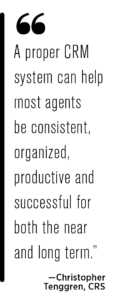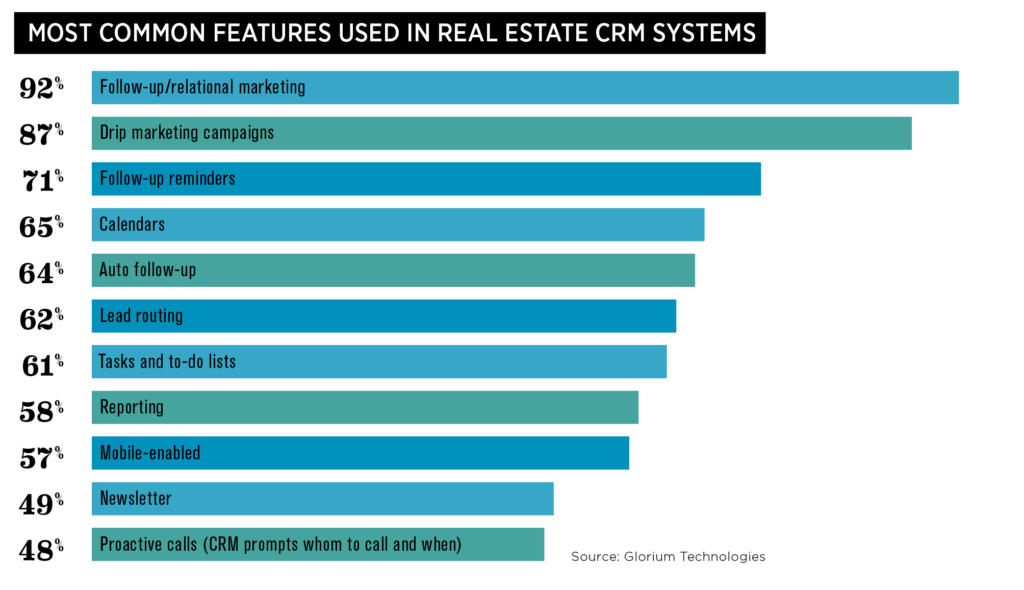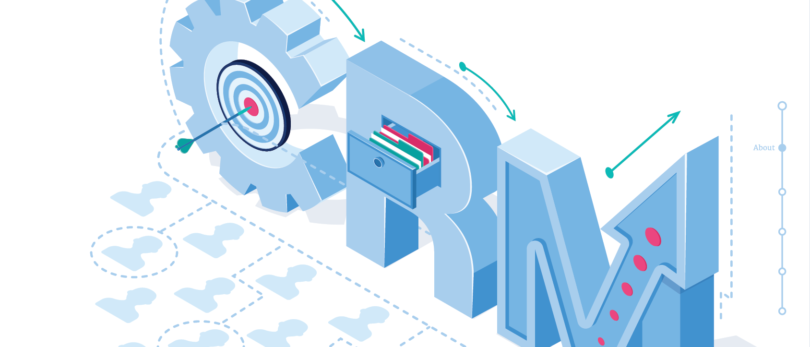Customer relationship management systems (CRMs) are extremely valuable and allow agents to easily handle client outreach
By Regina Ludes
When she entered the real estate business nearly 40 years ago, Joy Carter, CRS, associate broker at Keller Williams Realty Consultants in Coral Springs, Florida, tracked her client interactions using 3×5 index cards. As her business grew, she converted to Top Producer, a platform she continues to use today that reminds her about everything from clients’ birthdays to what documents she needs for presentations. She’s also learning to use Keller Williams’ in-house system because of its potential marketing reach.
Without these systems, Carter says she would feel lost and unable to complete many of her important tasks. “You’re losing too many opportunities if you don’t have a system that reminds you when to be in touch with clients, when a meeting takes place or when to follow up on special occasions,” Carter says. “It’s impossible to keep all those details in your head.”
In today’s demanding real estate marketplace, a customer relationship management (CRM) system helps busy agents stay organized by giving them access to a myriad of data. Some come with automated reminders so agents know when and how to contact clients and prospects. CRMs come in all shapes and sizes, from simple notebooks and index cards to more robust technology-based systems. When integrated with other platforms, a CRM can become a powerful tool to maximize an agent’s operations and improve the service they offer clients.
A system for tracking listing details
According to the National Association of REALTORS®, roughly half (48%) of agents report that they rarely or never use a CRM for their business. Yet, of agents who do use a CRM, 66% believe it’s very or somewhat impactful on their business.
One benefit of a CRM is the ability to customize it for your needs. Carter says her team notes any problems that occur with listings. “Anytime something goes wrong with a listing or closing or some information is missing, it’s noted into the CRM checklist so that it won’t happen again. The checklist may not apply to every transaction, but it’s better than forgetting to ask for the mailbox key or parking lot number in a condo sale,” Carter says.
There are more than 8,000 contacts in Carter’s CRM, including names of lenders, inspectors and other real estate agents. It also integrates well with MailChimp for her company’s email newsletter distribution.
“We have at least 240 tags for clients in the CRM, so we can pull up their profile in multiple ways, depending on what we’re looking for,” says Carter.
A system for following up with clients
When he first started in the business in 2013, Paul Rich, CRS, a broker-salesperson with The Brokerage in Henderson, Nevada, would keep his contacts in a notebook and then transfer the data to spreadsheets. “It didn’t take me long to realize I would not do well in this business if I didn’t have some kind of system for follow-up,” he recalls.
Since then, he has used several different CRM software platforms. After losing client business in a slow housing market last year, he switched to Lofty (formerly Chime) so he can receive reminders to follow up with clients. The most useful feature is the client interface which tells him at a glance when the last contact took place so he can begin to reach out to them again.
“Since my past clients can sometimes be ‘out of sight and out of mind,’ I’m making a point to review my data daily to ensure I have regular contact with them,” Rich says.
Lofty enables him to manage his marketing campaigns and track referrals and leads more effectively. He can set up personalized automated messages so clients aren’t all getting the same canned content. As he builds his sales team, he’ll be able to collaborate with associates and track their sales activities too.
Even with the new system, Rich knows he needs to stay on top of client data. When Rich browsed through his system recently, he noticed a past client’s name was missing. “I had lost track of them since the last transaction,” Rich says. “Next thing I know, they’re listing their house for sale, and it wasn’t with me.”
The combination of automated CRM-issued contact campaigns and a more consistent personal outreach plan has resulted in better ROI and increased referrals and business leads. By March of this year, Rich had already surpassed last year’s total sales. “I’m not relying solely on the CRM, but coupled with my business plan, I can stay top of mind with my clients,” Rich says.
Customize for your business needs
 The biggest mistake agents tend to make in their business is neglecting to follow up with clients or forgetting to stay in touch with them, says Christopher Tenggren, CRS, with Weichert REALTORS Signature Professionals in Rochelle, Illinois.
The biggest mistake agents tend to make in their business is neglecting to follow up with clients or forgetting to stay in touch with them, says Christopher Tenggren, CRS, with Weichert REALTORS Signature Professionals in Rochelle, Illinois.
“A CRM enables agents to manage their respective time, schedule and daily tasks. It also helps them develop a business plan, budget and goals, and frankly, be organized and treat their business as a real business,” Tenggren says.
He uses a franchise-owned system developed and customized by kvCORE. The platform is provided to all Weichert agents along with training. When used to its potential, Tenggren says, agents can systematize many of their business tasks, from designing a website and managing their client communications to listing and transaction management.
The platform also has an app that can be downloaded to mobile devices so users can review data in real time while on the go. The platform connects to several third-party marketing systems sites, social content providers and even QuickBooks.
Tenggren believes a real estate-specific platform can be especially helpful to agents. kvCore, for example, auto brands their agents’ marketing materials, which saves them time and money and helps them systematize their business.
“A proper CRM system can help most agents be consistent, organized, productive and successful for both the near and long term.”

Give your CRM a check-up with RRC’s webinar on evaluating your CRM. Purchase the single webinar or a webinar bundle at bit.ly/database-health.
Photo: iStock klyaksun








